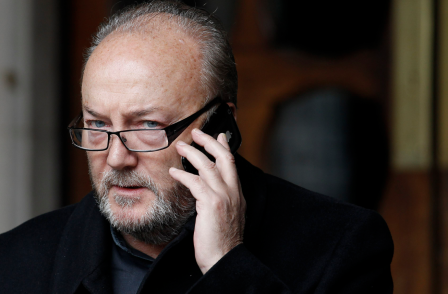
A Supreme Court victory for The Times in its seven-year battle to access secret Charity Commission files about George Galloway’s Mariam Appeal for Iraq could “blow open” the UK Freedom of Information Act.
A judgment today appears to set out a legal right for journalists to request information from public authorities even in cases where there is a specific exemption under the FoI Act.
Times investigations editor Dominic Kennedy first made his FoI request to the Charity Commission in June 2007 for information concerning three inquiries it carried out between 2003 and 2005 into George Galloway’s Mariam Appeal campaign against Iraq sanctions. The Mariam Appeal ran from 1998 to 2003.
His request was refused because because public inquiries are exempt from FoI.
Now the Supreme Court has said that the Charity Commission can disclose the information under a common law duty of openness.
Supreme Court judge Lord Mance said: “The Charity Commission has the power to disclose information to the public concerning inquiries on which it has published reports, both in pursuit of its statutory objective under the Charities Act 1993 of increasing public trust in, and the accountability of, charities, and under general common law duties of openness and transparency on public authorities. The exercise of that power will be subject to judicial review.”
The Times is now expected to request the information again from the Charity Commission. If it continues to refuse, The Times can take the matter to judicial review and a judge will have the ultimate decision over the release of the files.
On this point the Supreme Court said: “Given the importance of the principles of openness and transparency, courts will apply a very high standard of review to any decision not to disclose information in answer to questions of real public interest raised by a journalist in relation to inquiries on which the Charity Commission has published reports, and would take into account similar factors and provide a no less favourable standard of protection for a person seeking information, as any review under article 10 of the Convention."

Kennedy (pictured above) told Press Gazette: “The right to get information outside of the Freedom of Information Act is established by the judgment today.
“The public authority should give it to us if it is in the public interest. It also sets out the procedure that should be followed if the public authority doesn’t give you the information.
“This judgment applies to the Charity Commission but there is also a passage in the judgment which says that public authorities in general exist for the benefit of the public. The implication is that if there’s a wider public need for these public authorities to release information you can go for it.
“It would appear to blow open the Freedom of Information Act.
“The Charity Commission has fought tooth and nail to sit on these 25 lever arch files saying we can’t have the stuff because it's an inquiry.
“The government has treated the Freedom of Information Act as a menu of things they can choose from. The Supreme Court is saying that's not the approach to take. You can ask for information from a public authority just because it is a public authority and it should act in the public benefit.”
Kennedy was represented by the law firm Bates Wells Braithwaite. BWB partner Rupert Earle said: "This judgment is an important development in ensuring that those exercising power, particularly quasi-judicial power, may be held to account, and is a tribute to Mr Kennedy’s dogged determination in pursuing his request for (so far) nearly seven years."
Email pged@pressgazette.co.uk to point out mistakes, provide story tips or send in a letter for publication on our "Letters Page" blog
